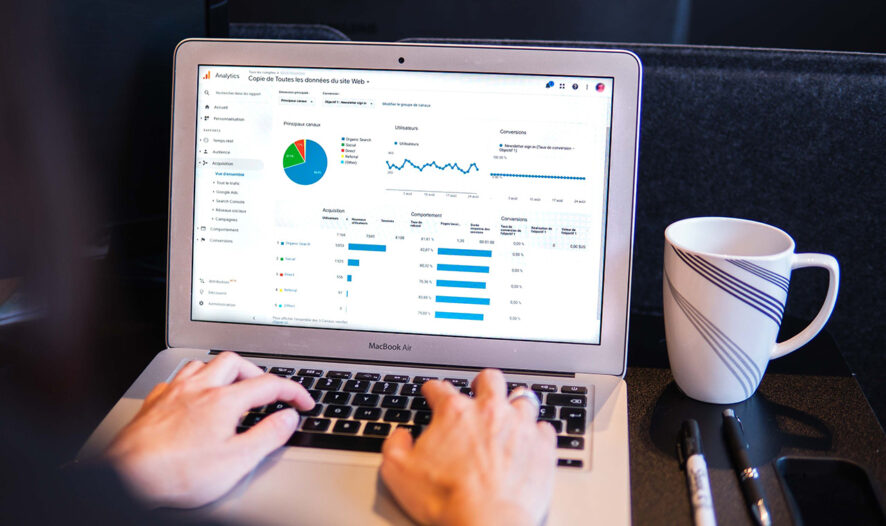If you’re still unsure about where to start, we can help.
With our free tips and guidance, you can build a better digital marketing setup. But if you don’t have the time or resources to manage it all on your own, we can support you. Get in touch to find out how.
Google Analytics (GA) is a data tracking tool and platform from Google. It allows you to keep track of the performance of your ads, websites, applications, videos, and social networking accounts.
Google Analytics enables you to understand how your visitors, users, and customers are coming to your website or app, and interacting with your pages and digital products.

How does Google Analytics work?
Google Analytics uses JavaScript tags. These are placed within the code of each of your website or app pages to collect essential data about your visitors. With these tags, Google Analytics develops insightful and simplified reports that give you vital information about your visitor activity, including:
- The number of visitors you get.
- The number of people visiting for the first time and those revisiting.
- What pages they visit.
- The average time they spend on each page.
- Where they came from (social media, ads, etc.)
- If they fulfilled your call to action.
- Where they’re located.
- And more.
All this information is key. It can help you make better decisions about your ads, web pages, and business. With it, you know what to improve; where to increase or reduce budgets for your Pay Per Click (PPC) campaigns; and find out what you’re likely doing wrong.
Who should use Google Analytics?
Simply put, everyone. If you have a blog, business or organisation that you’re trying to get online visibility for, Google Analytics is your best friend. Start-ups, large and small businesses, and even charitable organisations that are using a website and/or mobile apps to reach their customers/donors, can all benefit from Google Analytics.
If you own a website or app, you should have Google Analytics installed across your pages. It’ll give you invaluable insights, improve your page awareness and acceptance, and basically help you perform better online.


Support Services
Explore our services to see how we can support you.
We work with clients of all sizes, ambitions, and expectations, and with budgets that start from as little as £150pm to over £1.5m each year. Explore our simple-to-understand packages that take the pressure off, so that you can focus on what you do best.
How to set up Google Analytics
To start benefitting from Google Analytics, here are some first steps you need to take:
- You need to have or open a valid Google Account.
- Open a Google Analytics account.
- Set up the property you want to track (your app or website details). You can attach up to 50 properties to one Google Analytics account.
- Create the report views you want (of performances you want to track). You can create no more than 20 per property.
- Install your Google Analytics tracking code on your website or application.
- Check on your ‘view reports’ to ensure the codes are working correctly.
Should I link my Google Analytics to Google Ads?
If you have a Google Ads account and run online ads, the answer is YES.
You can’t fully experience the benefits of Google Ads without linking your account to Google Analytics. When linked, you get to see the whole journey of the customers that interact with your ads and visit your websites. You’ll get an insight into things like:
- Where they found your ad.
- How they engaged with your ad.
- What they did on your page.
- And if they fulfilled your ad goal (i.e., purchased an item, subscribed, or read and reshared your content.)
This is information that can save you time and money. It helps you improve and optimise your ads so that you can see better engagement and profit.
The information you gain about your ad performance and audience will also guide your remarketing decisions.
By linking Google Ads to Google Analytics, you can even create Specific Audience Lists that can be used to retarget your website visitors in your future Google Ads campaigns.
How to connect Google Analytics to Google Ads
First, you need to ensure you have ‘admin’ access to your Google Ads and ‘edit’ access on your Analytics account. You should also be using the same email address for both platforms.
Now, sign into your Google Analytics account and follow the steps below:
- Head to the Admin section of your Google Analytics account.
- Under the property column, click on Google Ad linking.
- Select the google ads account(s) you want to link by clicking on the ID.
- Click continue and type in the title you want each account you linked to bear (it helps to know which data you’re tracking)!
- Now turn on the views you want to track on that account.
- You can also enable the auto-tagging feature to allow Google Analytics to pull in all the vital data generated on your linked account.
- Click on the link account button to complete the process.
And there you have it. That should get you started on Google Analytics, and on your way to boosting your visibility and performance online.

Get a free website health-check.
Find out if your website is depriving you of visitors. Request our free website health-check to identify common issues with speed, user experience, and performance. We’ll deliver this in a clear report along with some basic recommendations and quick fixes.
Learn more about health-checks
Frequently asked questions
-
Your website statistics tell you where your visitors are coming from and how they are engaging with your site. Here are the main metrics to consider.
-
Site engagement is the actions visitors take while on your website. This analysis includes various performance indicators that allow you to determine if your page offers value to your visitors and which areas to improve. Here are some tips to help you with that.
-
Brand awareness is crucial for your business because people who know and recognise your business are much more likely to engage with it. With Google Ads, you can set up your advertising campaign to achieve a specific goal. Here’s how.
Start a Conversation
Request a call-back to see how we can support your digital growth.















